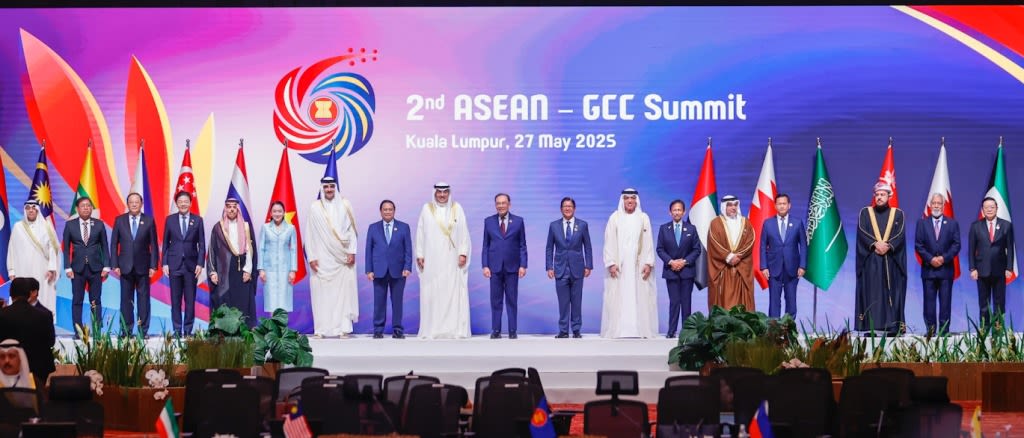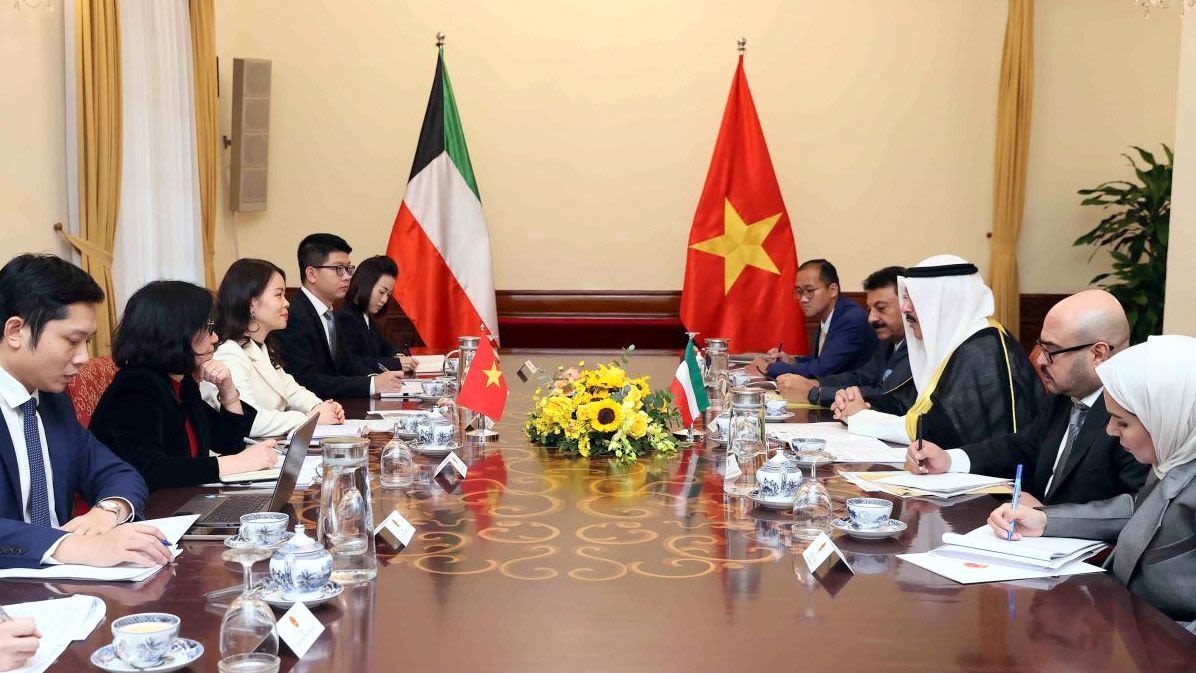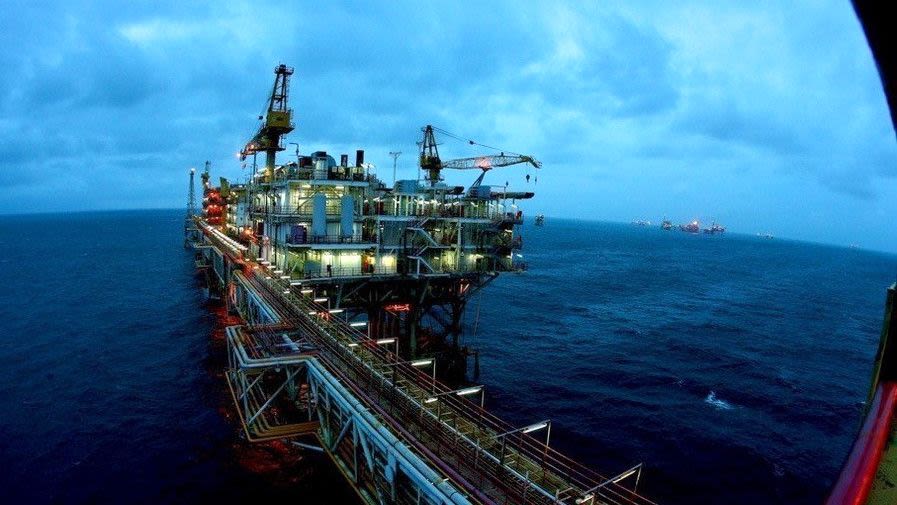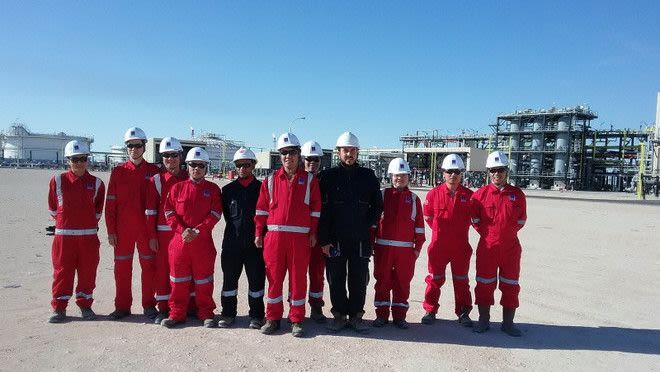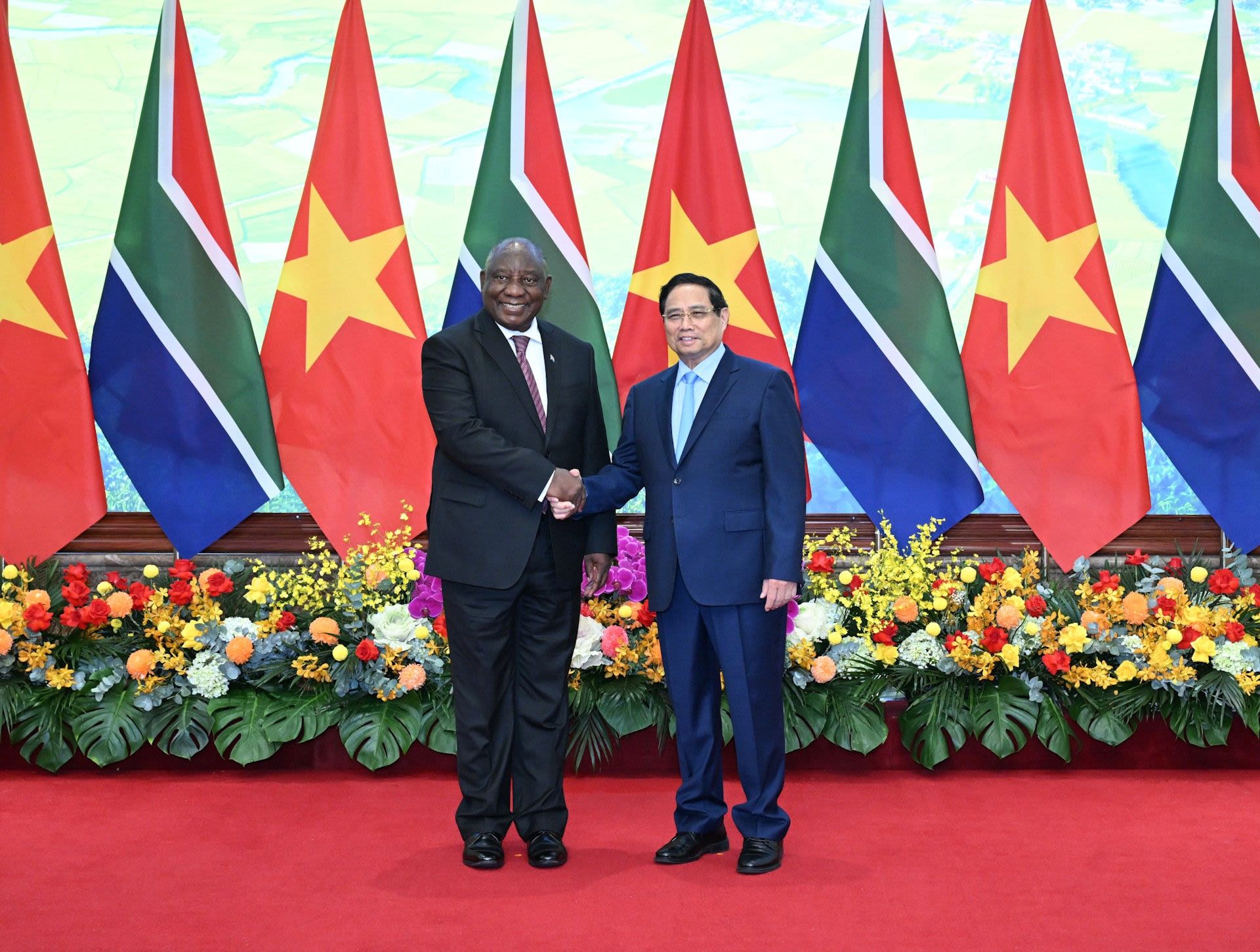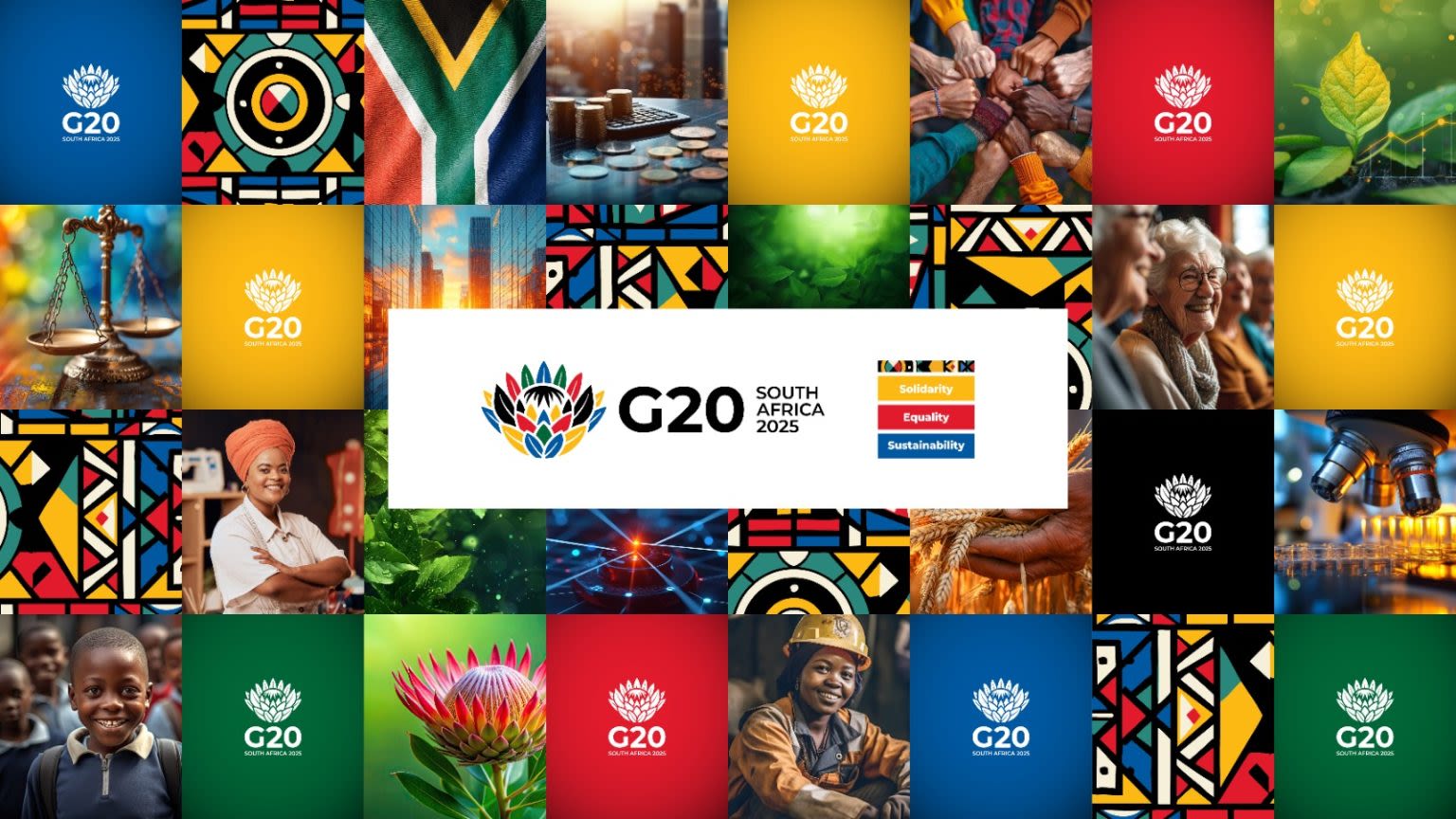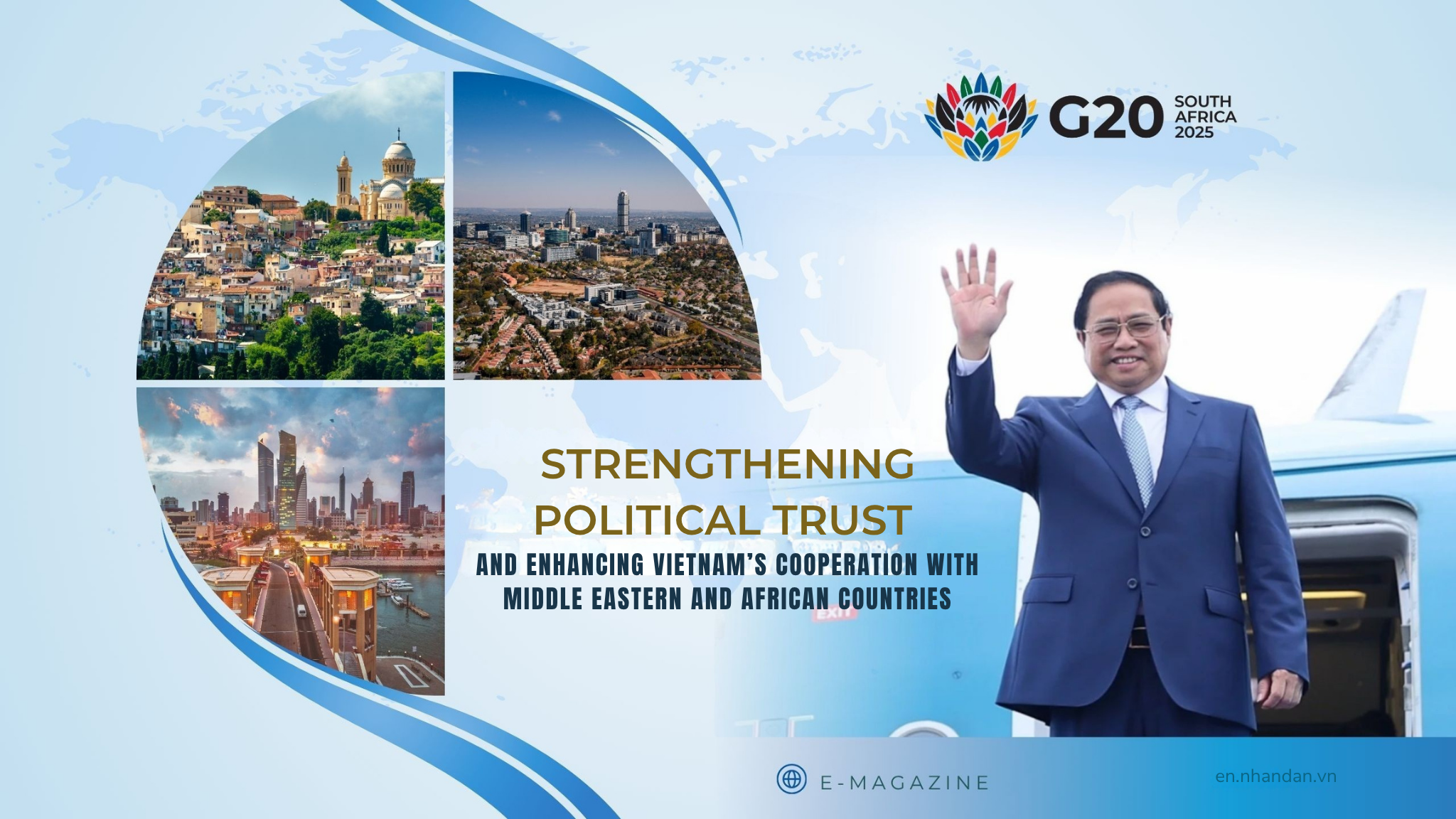
At the invitations of Kuwaiti Prime Minister Sheikh Ahmad Abdullah Al-Ahmad Al Sabah, Algerian Prime Minister Sifi Ghrieb and South African President Matamela Cyril Ramaphosa, who is also Chair of the G20 in 2025, Vietnamese Prime Minister Pham Minh Chinh, his spouse and a high-ranking Vietnamese delegation are paying official visits to Kuwait and Algeria, and attending the G20 Summit and bilateral activities in South Africa from November 16-24.
The visits aim to strengthen political trust, deepen friendly relations, and foster multifaceted cooperation between Viet Nam and Kuwait, Algeria and South Africa in particular, and Middle Eastern and African countries in general. They also affirm Viet Nam’s growing role, position and international prestige, as well as its increasingly active and responsible contributions at multilateral conferences and forums, including the G20.
Prime Minister Pham Minh Chinh and other leaders at the second ASEAN-Gulf Cooperation Council (GCC) Summit in Kuala Lumpur, Malaysia, on May 27, 2025. Photo: VGP
Prime Minister Pham Minh Chinh and other leaders at the second ASEAN-Gulf Cooperation Council (GCC) Summit in Kuala Lumpur, Malaysia, on May 27, 2025. Photo: VGP
Opportunity to expand markets in the Middle East
This is the first visit by a senior Vietnamese leader to Kuwait in 16 years, taking place at a time when the two countries are preparing to mark the 50th anniversary of diplomatic ties in January 2026. This diplomatic activity follows Prime Minister Pham Minh Chinh’s visit to three Gulf countries in 2024, reflecting Viet Nam’s determination to implement its foreign policy strategy towards the Middle East and promptly realise Resolution 59 on international integration in the new context.
Through such high-level diplomatic engagements, Viet Nam continues to reinforce friendly relations, enhance political trust and expand its markets. The two sides have signed numerous cooperation agreements in economics, science, technology, trade, air transport, culture and the arts, sports, among others.
The 4th Viet Nam-Kuwait Political Consultation in December 2024. Photo: VNA
The 4th Viet Nam-Kuwait Political Consultation in December 2024. Photo: VNA
Kuwait is increasingly affirming its important role in multilateral forums and international organisations. It is a member of the United Nations, the Non-Aligned Movement, the Arab League (AL), the Gulf Cooperation Council (GCC), the Organisation of the Petroleum Exporting Countries (OPEC), the Organisation of Islamic Cooperation (OIC), and the Inter-Parliamentary Union (IPU), among others.
A notable feature of Kuwait’s foreign policy is its active participation in regional and global multilateral organisations, as well as its humanitarian support for countries in difficulty. Humanitarian assistance and charitable work constitute a key pillar of Kuwait’s foreign policy, reflected in the activities of the Kuwait Red Crescent Society and domestic charitable organisations in recent years.
Viet Nam and Kuwait still have considerable potential for cooperation in such fields as oil, gas and energy. Photo: VNA
Viet Nam and Kuwait still have considerable potential for cooperation in such fields as oil, gas and energy. Photo: VNA
Under its “Vision 2035”, Kuwait aims to become a regional and global financial and commercial hub, focusing on economic diversification, social development and sustainable development, transforming Kuwait into a dynamic, modern nation.
To achieve this, Kuwait has introduced specific measures such as establishing more than 3,500 small enterprises to reduce dependence on oil exports, raising GDP by 1.5%, improving the quality of education and healthcare, enhancing living standards, and increasing the share of renewable energy by 15%.
Vietnamese Ambassador to Kuwait Nguyen Duc Thang emphasised that the time is ripe for the two countries to consolidate and strengthen their bilateral relations, elevating them to a new level and contributing practically to the development goals of both sides — for Viet Nam, the goal of becoming a developing country with modern industry and one of the world’s top 30 economies by 2030, striving to become a developed, high-income, prosperous, and happy nation by 2045; and for Kuwait, “Vision 2035”, which aims to turn the country into a leading financial and commercial centre in the region and the world.
It can be fully affirmed that the time is ripe for Viet Nam and Kuwait to consolidate and strengthen their bilateral relations, elevating them to a new level and contributing practically to the development goals of both sides.
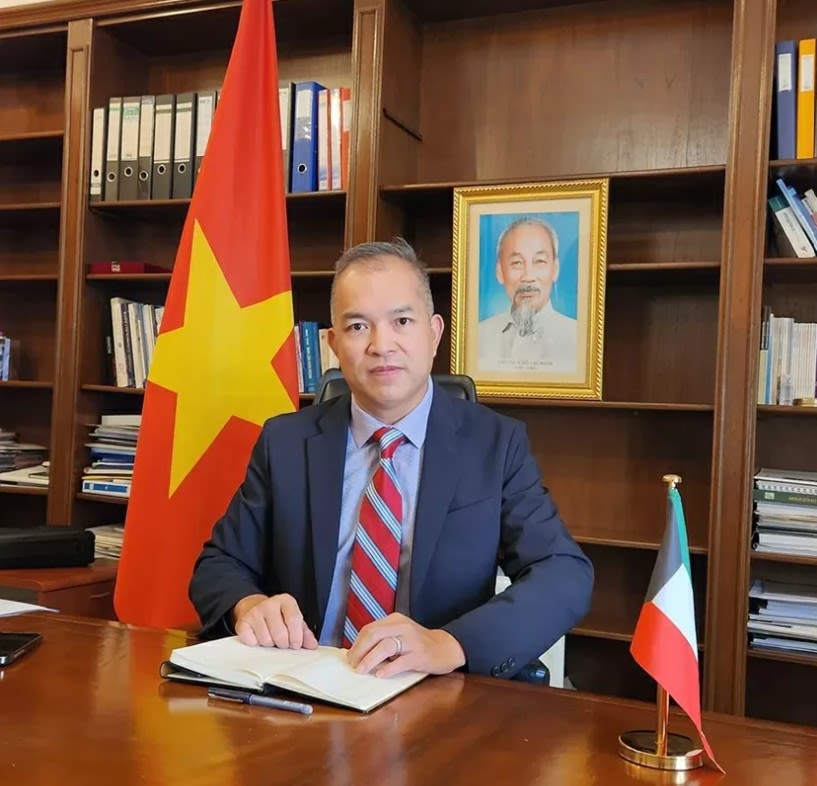
Vietnamese Ambassador to Kuwait
Nguyen Duc Thang
According to Ambassador Nguyen Duc Thang, based on the outcomes of the prime minister’s official visit to Kuwait in November and as the two countries approach the 50th anniversary of diplomatic ties in January 2026, Viet Nam–Kuwait relations have been placed within a new, higher, and broader framework that requires efforts from both sides.
First of all, Viet Nam needs to prioritise several practical and effective measures to create momentum for a new phase of cooperation between the two countries. Next, Viet Nam should demonstrate a more proactive and active role in expanding cooperation with Kuwait while developing a comprehensive approach to the GCC region — both unified and synchronised, as well as tailored to each individual country.
Viet Nam–Kuwait relations have been placed within a new, higher, and broader framework that requires efforts from both sides.
According to Ambassador Nguyen Duc Thang, at the regional level, Viet Nam needs to implement harmonised policies for the entire GCC through investment promotion, a free trade agreement, Halal standards, carbon credits, and the digital economy; while for Kuwait specifically, Viet Nam must adjust flexibly based on this country’s geographical characteristics, population size, financial investment methods, food security needs, infrastructure development, and tourism, thereby maximising mutual benefits and affirming Viet Nam’s position as a reliable and sustainable partner.
Alongside political commitment between the two countries, close and coordinated cooperation at all levels will be the key for Viet Nam and Kuwait to overcome difficulties and differences, capitalise on opportunities and each side’s potential, and bring bilateral relations into a new and more comprehensive and sustainable phase of development.
Viet Nam and Algeria share aspiration for sustainable and prosperous development
As the third-largest economy in Africa, Algeria is rich in crude oil and natural gas. This is also the country’s main economic sector, accounting for around 30% of its gross national product (GNP), 60% of its budget revenue, and more than 90% of its export value.
Algeria pursues an independent and diversified foreign policy to take advantage of favourable conditions for socio-economic development; and actively contributes to strengthening solidarity within the African Union (AU), the Arab bloc, and promoting South–South cooperation.
Delegates visit a photo exhibition on milestones in Viet Nam–Algeria relations. Photo: VNA
Delegates visit a photo exhibition on milestones in Viet Nam–Algeria relations. Photo: VNA
Algeria plays an important role and has an influential voice in the North African and Sahel regions, and it is one of the five largest financial contributors to the AU. Algeria is a member of the United Nations, the Non-Aligned Movement, the AU, the Arab League (AL), and the Organisation of the Petroleum Exporting Countries (OPEC). Algeria is an observer of the World Trade Organisation (WTO) and is in the process of negotiating its accession.
Viet Nam and Algeria established diplomatic relations on October 28, 1962 (Viet Nam had recognised the Provisional Revolutionary Government of the Republic of Algeria on September 26, 1958. Algeria had a representative at the National Front for the Liberation of South Viet Nam from 1963). In November 1962, Viet Nam opened its Embassy in Algiers and in April 1968, Algeria opened its embassy in Ha Noi. During the 1980s and early 1990s, Viet Nam sent more than 1,000 medical, educational, and agricultural experts to work in Algeria. At the peak period (2016–2018), more than 6,000 Vietnamese workers came to work in Algeria. Currently, there are around 1,000 Vietnamese workers, mainly working for foreign construction contractors.
Vietnamese and Algerian experts at the Bir Seba oil field. The success of the Bir Seba oil and gas joint venture is considered a typical cooperation model between the two countries. Photo: VNA
Vietnamese and Algerian experts at the Bir Seba oil field. The success of the Bir Seba oil and gas joint venture is considered a typical cooperation model between the two countries. Photo: VNA
In addition to state-to-state cooperation, relations between the Communist Party of Viet Nam and the National Liberation Front of Algeria (FLN) continue to maintain their traditional friendship. The two sides are promoting the signing of a new cooperation agreement aimed at strengthening delegation exchanges and sharing experiences in party building and social governance. At the local level, Dien Bien Province (Viet Nam) and Batna Province (Algeria) — both considered “cradles of revolution” — have established twinning relations. This is regarded as a meaningful cooperation model that helps deepen people-to-people ties.
Ambassador of Viet Nam to Algeria Tran Quoc Khanh affirmed: “Viet Nam and Algeria have together overcome the darkest moments of history: the struggle for decolonisation and the wars of independence and freedom. We stood by each other and achieved victory together. It is an invaluable asset that today’s generations have the responsibility to preserve and uphold.”
With firm political trust and determination from both sides, Viet Nam–Algeria relations will enter a new stage of development, worthy of the history of traditional friendship and the expectations of the peoples of both countries.

Vietnamese Ambassador to Algeria
Tran Quoc Khanh
According to the Ambassador, in a context of international volatility, strategic trust between Viet Nam and Algeria becomes even more important. When trust exists, many areas of cooperation become achievable. If in the past the two countries shared the aspiration for independence, today Viet Nam and Algeria share the aspiration for sustainable and prosperous development.
“I firmly believe that with strong political trust and determination from both sides, Viet Nam–Algeria relations will enter a new stage of development, worthy of the history of traditional friendship and the expectations of the peoples of both countries,” Ambassador Tran Quoc Khanh stated.
Many cooperation opportunities and potentials between Viet Nam and South Africa
The relationship between Viet Nam and South Africa has a strong historical imprint, originating from the historic meeting between representatives of the Government of the Democratic Republic of Viet Nam and the African National Congress (ANC) at the Bandung Conference in Indonesia in 1955. Viet Nam’s victory in its struggle for national liberation and reunification became a powerful source of inspiration and a valuable lesson for the people of South Africa in their fight against the apartheid regime, which led to the establishment of democracy in 1994.
Since the official establishment of diplomatic relations on December 22, 1993, the two countries have continuously strengthened their friendship and achieved significant achievements in various fields. As leading partners of each other in Southeast Asia and Africa, South Africa is the only African nation with which Viet Nam has established a partnership for cooperation and development.
Prime Minister Pham Minh Chinh meets with President of the Republic of South Africa Matamela Cyril Ramaphosa during the latter’s state visit to Viet Nam on October 23, 2025. (Photo: Tran Hai)
Prime Minister Pham Minh Chinh meets with President of the Republic of South Africa Matamela Cyril Ramaphosa during the latter’s state visit to Viet Nam on October 23, 2025. (Photo: Tran Hai)
Bilateral economic ties have achieved remarkable results, with trade turnover increasing from 192 million USD in 2007 to nearly 1.8 billion USD in 2024, maintaining stability even during the Covid-19 pandemic. Viet Nam’s main exports to South Africa include electronics, mobile phones, textiles, footwear, and agricultural products such as coffee, rice, cashew nuts, and pepper, while importing minerals, coal, fruits, wood, and chemicals from South Africa.
To fully tap existing potential, the two sides are now focusing on new areas of cooperation such as green energy and equitable energy transition, e-commerce, finance and banking, tourism, and investment — all of which still offer considerable room for development, especially with the participation of the two nations in regional free trade agreements.
South African friends pose for photos with Vietnamese conical hats during the 2023 Viet Nam Pho Day event in South Africa. (Photo: VNA)
South African friends pose for photos with Vietnamese conical hats during the 2023 Viet Nam Pho Day event in South Africa. (Photo: VNA)
Vietnamese Ambassador to South Africa Hoang Sy Cuong said that Viet Nam and South Africa, with their strong commitments to sustainable development, possess great potential for cooperation in green energy, climate finance, and equitable energy transition.
South Africa, with its 8.5 billion USD Equitable Energy Transition Partnership (JETP) programme, is leading in developing renewable energy and green hydrogen — particularly via the JET Investment Plan (2023–2027), which is creating thousands of green jobs in coal-mining regions such as Mpumalanga Province.
“Viet Nam and South Africa, with their strong commitments to sustainable development, possess great potential for cooperation in green energy, climate finance, and equitable energy transition.”
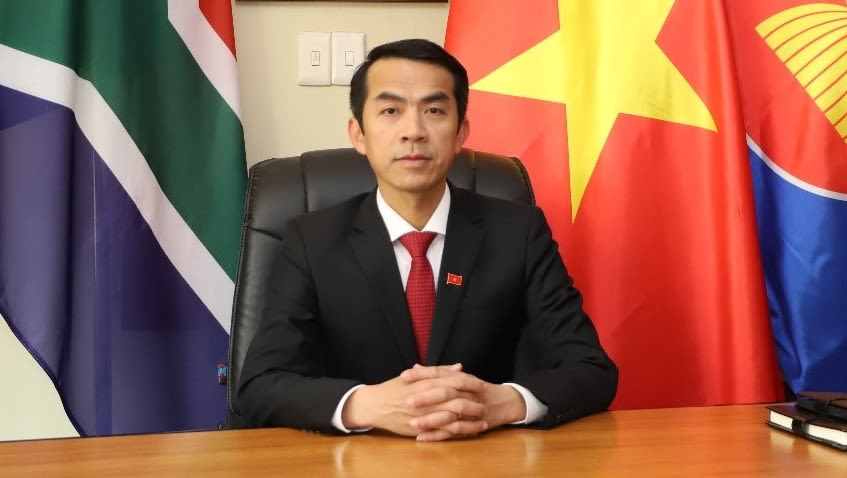
Vietnamese Ambassador to South Africa
Hoang Sy Cuong
Viet Nam is actively promoting wind and solar energy and supporting communities in their transition away from coal through the 15.5 billion USD Just Energy Transition Partnership (JETP) and its comprehensive Power Development Plan VIII (PDP8).
The two countries can cooperate in specific areas such as sharing technology in green hydrogen production and developing smart grids; co-financing green funds; and supporting small and medium-sized enterprises to participate in sustainable value chains.
The two countries can cooperate in specific areas such as sharing technology in green hydrogen production and developing smart grids; co-financing green funds; and supporting small and medium-sized enterprises to participate in sustainable value chains.
Ambassador Hoang Sy Cuong stated that Viet Nam could learn from South Africa’s Presidential Climate Commission (PCC) model, where stakeholders jointly develop policies for a just transition and the creation of green jobs.
In contrast, South Africa could draw lessons from Viet Nam’s experience of the “solar boom”, which saw 16GW of installed capacity added within two years, thanks to a competitive auction mechanism and digital transformation. This helped reduce energy poverty and sustain economic growth.
This cooperation not only strengthens the Partnership for Cooperation and Development but also contributes to establishing a model of South-South cooperation.
Established in 1999, the G20 group includes the G7 countries (United States, Canada, United Kingdom, France, Germany, Italy, Japan) and major economies such as China, India, Brazil, Russia, Australia, Argentina, Mexico, the Republic of Korea, Indonesia, South Africa, Saudi Arabia, Turkey, the European Union (EU), and the African Union (AU), which joined in 2023.
The G20 is a globally influential mechanism, attracting participation from all major and emerging economies. It plays an increasingly important role in promoting the involvement and voice of developing countries in global governance, thereby contributing to shaping norms and principles in a direction that increasingly benefits developing nations. The G20 accounts for approximately 67% of the world’s population, 85% of global GDP, and 75% of international trade.
The G20 accounts for approximately 67% of the world’s population, 85% of global GDP, and 75% of international trade.
Since 2008, the G20 has held 19 Summits, excluding extraordinary Summits. The 20th Summit will be held in Johannesburg, South Africa, from 22–23 November 2025.
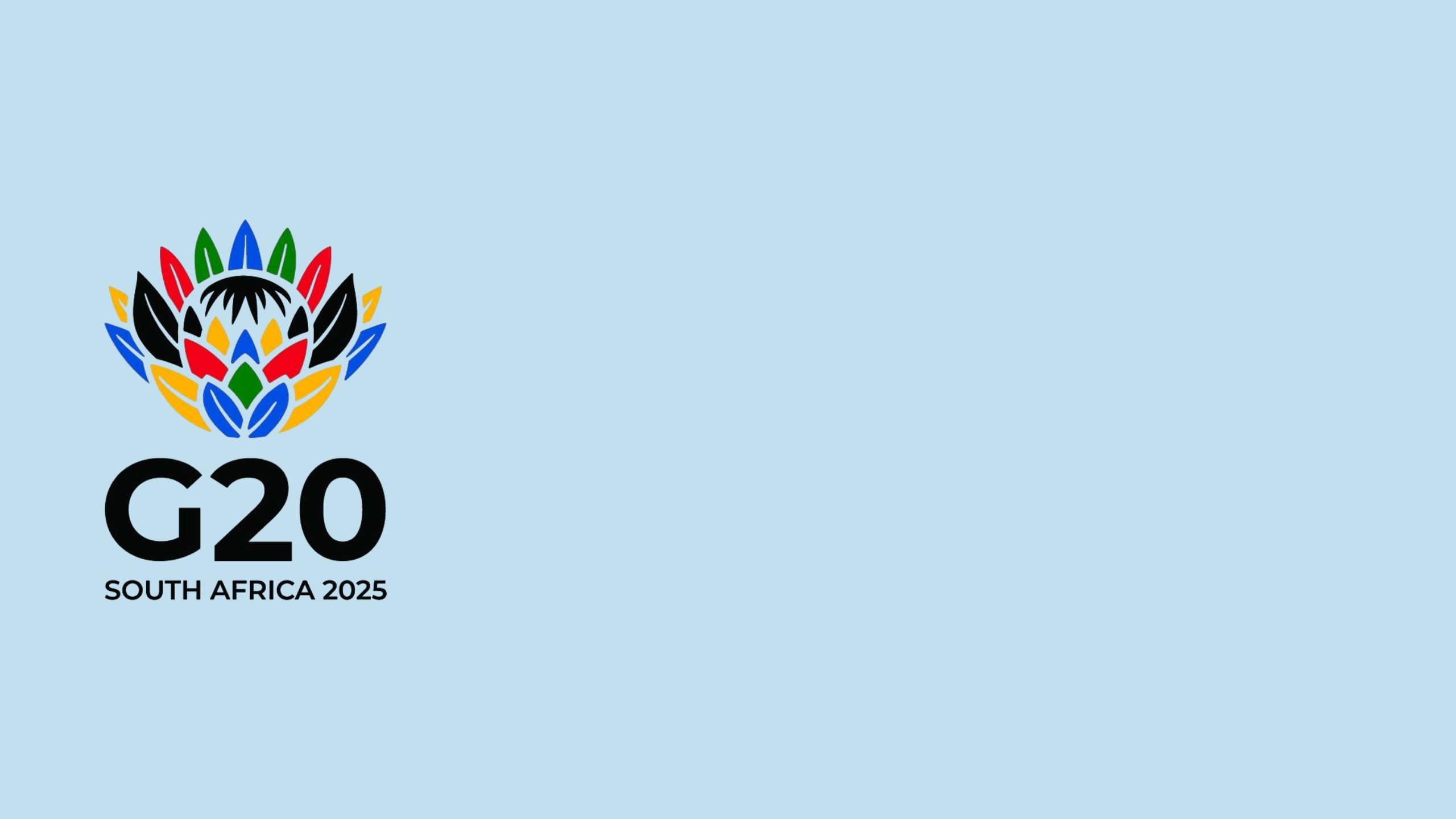
Published: November 2025
Production managers: Minh Duc - Truong Son
Content: Hong Cam
Translation: NDO
Design: Trung Hung
Source: Ministry of Foreign Affairs, VNA

